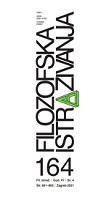Razvoj ljudskih kapaciteta i legitimnost državne intervencije
Development of Human Capacities and the Legitimacy of State Intervention
Author(s): Michal Sládeček Subject(s): Political Philosophy, Government/Political systems, History and theory of political science
Published by: Hrvatsko Filozofsko Društvo
Keywords: John Rawls; state intervention; capacity; liberalism; Martha Craven Nussbaum; perfectionism; Jonathan Quong; Joseph Raz;
Summary/Abstract: Analysis starts from Rawls’s view that in a liberal society autonomous persons should have two moral powers – the capacity for a sense of justice and the capacity to establish, pursue and revise the concept of the good. Political or neutral liberalism advocates the justification of state intervention to improve the first type of capacity while declaring the interference with the second capacity illegitimate. The critique of this standpoint is done by analysing the perspectives of Jonathan Quong and Martha Nussbaum, showing that they lead to allowing irrational and authoritarian perspectives in education, that is, neglecting the development of valuable capacities. Although institutional influence can be biased and paternalistic, in some cases it may be legitimate for the institution to create conditions that enhance people’s ability to evaluate, reevaluate, and revise their conceptions of the good.
Journal: Filozofska istraživanja
- Issue Year: 41/2021
- Issue No: 04/164
- Page Range: 737-749
- Page Count: 13
- Language: Croatian

